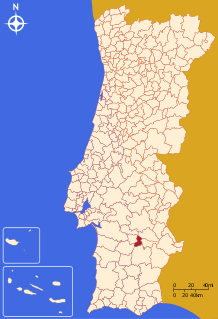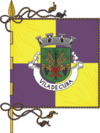Cuba, Portugal
Cuba (Portuguese pronunciation: [ˈkuβɐ] (![]()
Cuba | |
|---|---|
.jpg) Roman bridge over Odivelas stream | |
 | |
| Coordinates: 38°09′N 7°53′W | |
| Country | |
| Region | Alentejo |
| Intermunic. comm. | Baixo Alentejo |
| District | Beja |
| Parishes | 4 |
| Government | |
| • President | João Português (CDU) |
| Area | |
| • Total | 172.09 km2 (66.44 sq mi) |
| Population (2011) | |
| • Total | 4,878 |
| • Density | 28/km2 (73/sq mi) |
| Time zone | UTC±00:00 (WET) |
| • Summer (DST) | UTC+01:00 (WEST) |
| Local holiday | April 24 |
| Website | http://www.cm-cuba.pt |
The current mayor (since 2013) is João Português. The municipal holiday is Monday after Easter.
History
The name "Cuba" is likely of Arabic origin, pertaining to the qubba, that is "tombs", of ascetic spiritual leaders. Such toponyms are frequent in Southern Portugal and likely related to the Sufi movements that flourished during the period of Almoravid decay, such as the one led by Ibn Qasi.[3]
In the 20th century a few scholars sought to turn Columbus into a Portuguese. One of these attempts had him born in the town of Cuba, after which he would have named the Caribbean island. (See possible birthplace of Christopher Columbus.) A statue honouring the explorer can be seen on the city centre.
Parishes
Administratively, the municipality is divided into 4 civil parishes (freguesias):[4]
- Cuba
- Faro do Alentejo
- Vila Alva
- Vila Ruiva
References
- Instituto Nacional de Estatística
- "Áreas das freguesias, concelhos, distritos e país". Archived from the original on 2018-11-05. Retrieved 2018-11-05.
- Mattoso, José (2006). D. Afonso Henriques, p. 146. Círculo de Leitores, Mem Martins. ISBN 972-42-3867-9.
- Diário da República. "Law nr. 11-A/2013, page 552 44" (pdf) (in Portuguese). Retrieved 21 July 2014.

